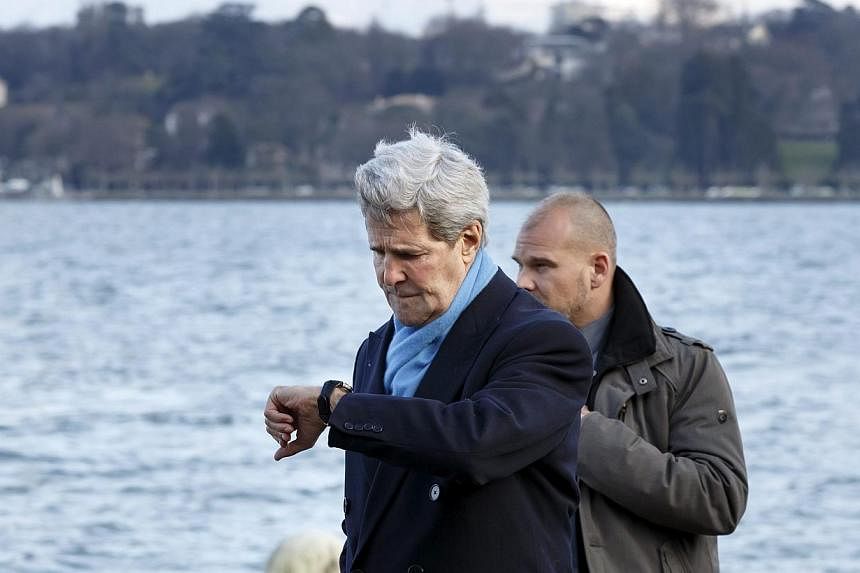GENEVA (AFP) - US Secretary of State John Kerry arrived in Geneva Sunday for fresh talks with his Iranian counterpart on Teheran's nuclear programme, after warning "significant gaps" remain ahead of a key deadline.
World powers are trying to strike a deal with Iran that would prevent Teheran from developing a nuclear bomb in return for an easing of punishing international economic sanctions.
Iran denies its nuclear programme has military objectives.
Kerry had been set to arrive in the Swiss city Sunday morning for two days of talks with Iranian Foreign Minister Mohammad Javad Zarif, but was delayed in London.
When he finally arrived, he took a quick stroll in the blistering cold along the shores of Lake Geneva before sitting down for a briefing with the US negotiating team.
He was scheduled to meet Zarif Sunday evening.
US and Iranian diplomats have been meeting in Geneva since Friday, and senior negotiators from the so-called P5+1 group of Britain, China, France, Russia, the United States and Germany were also expected to meet on Sunday to help drive the talks forward.
There is a heightened sense of urgency as the clock ticks down towards a March 31 deadline to agree on a political framework for the deal.
Kerry warned in London Saturday that "there are still significant gaps, there is still a distance to travel." But, he added: "President (Barack) Obama has no inclination whatsoever to extend these talks beyond the period that has been set out."
Akbar Velayati, the diplomatic adviser to Iran's supreme leader Ayatollah Ali Khamenei, shot back Sunday that "if American leaders don't want to negotiate, it's up to them, but they were the ones who were after negotiations".
Wang Qun, director general of the arms control and disarmament department of the Chinese foreign ministry, acknowledged that the talks faced "difficulties".
"We anticipate more difficulties as we move to the final phase," he told reporters in Geneva, while adding "our resolve is greater than the difficulties."
In a sign of the growing push for an accord, US Energy Secretary Ernest Moniz is taking part in the talks for the first time, as is Ali Akbar Salehi, the director of the Iranian Atomic Energy Organisation.
Observers said their participation was a sign that a deal could be within reach.
Iranian President Hassan Rouhani told government officials Sunday the composition of Iran's negotiation team, which also now includes Rouhani's brother, Hossein Fereydoun, showed the country's "firm determination for interaction with the world."
Kerry, however, played down the changes in the Iranian camp, saying Moniz was present because of the "technical" nature of the discussions.
While the political aspects of the deal must be nailed down by the end of next month, the deadline for signing the full agreement is June 30 - a cut-off point that looms all the larger after two previous deadlines were missed.
A key stumbling block in any final deal is thought to be the amount of uranium Iran would be allowed to enrich, and the number and type of centrifuges Tehran can retain.
Under an interim deal reached in November 2013, Iran's stock of fissile material has been diluted from 20 per cent enriched uranium to five percent in exchange for limited sanctions relief.
Experts say such measures diminished Iran's ability to make an atomic weapon, which Teheran denies pursuing in the first place.
Negotiations have been thwarted by hardliners both in Iran and the United States, as well as by Israel lobbying against a deal.
Israeli Prime Minister Benjamin Netanyahu is controversially planning to address the US Congress on the issue on March 3, a move aimed at torpedoing any deal which he insisted Sunday would "allow Iran to develop the nuclear capabilities that threaten our existence." The agreement under discussion, he told a cabinet meeting, was "dangerous for Israel, the region and the entire world." Observers stressed the urgency of reaching an agreement and warned that a failure to do so would have dire consequences.
"Another extension is extremely unlikely," Kelsey Davenport, head of the Nonproliferation Policy Arms Control Association in Washington, said.
If no agreement is reached, she warned, both sides will likely head "back down the path of escalation, with Washington increasing sanctions and Iran ramping up its nuclear program".

